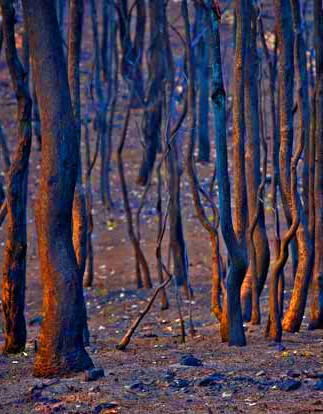Fire farming dated back 41,000 years
 New research suggests Aboriginal people were using fire management on a Tasmanian island at least 41,000 years ago.
New research suggests Aboriginal people were using fire management on a Tasmanian island at least 41,000 years ago.
A joint project involving the Tasmanian Aboriginal Centre (TAC) brought fire ecologist David Bowman and Australian National University natural history professor Simon Haberle to lungtalanana/Clark Island in Bass Strait to study the aftermath of fires in 2014.
Their core samples from a lake on the island containing charcoal and pollen were used to reconstruct the island's fire history by determining how often vegetation had burnt over a period of millennia.
“We found a lake which had superb organic sediments in the base and we assumed that they were just from the last 10,000 years,” Professor Bowman said.
“We radiocarbon dated the sediments and we discovered, to our amazement, that these sediments actually stretch back to 40,000 years.
“We found a site which is quite unique in southern Australia and indeed the southern hemisphere.”
Professor Haberle said the core sample showed fire regimes on the island had changed substantially over the 41,000-year period.
“Part of that change was really due to the landscape management activities of Tasmanian Aboriginal people as they lived on those islands and used fire as a tool to manage the landscape,” he said.
“What we see is that over most of the period of the record, frequent and low-intensity fires occurred on the island.
“This can really only happen through regular burning of the vegetation, most likely because of people lighting those fires and managing the landscape.”
Professor Haberle said fires became more intense after Tasmanian Aboriginal people left the island.
“When Europeans arrive there is a change in the fire regime and there are many very strong fires and in many cases catastrophic fires have occurred in the recent past,” he said.
“Those fires are a result of the kind of changes in the land management strategy.”
Professor Bowman said traditional burning could still be used for fire mitigation today.
“This would be, I think, a really great aspiration for Tasmania - to help a group of people who have had their culture disrupted by colonisation to rekindle their traditions and actually serve their society, our society, by making flammable, dangerous environments much safer,” he said.
“This is getting quite urgent now because of the deteriorating climate conditions.
“We must learn from the past, we must learn from the first Australians.
“They obviously did something very clever, that they were able to sustainably coexist in a very flammable environment.”








 Print
Print